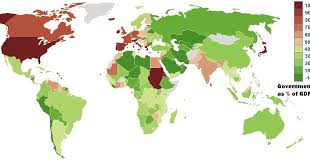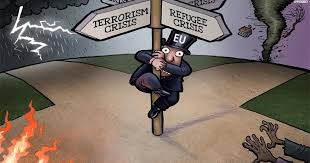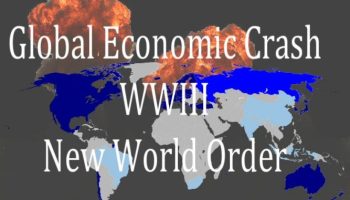In a world facing challenges and uncertainties, embrace opportunities for success through innovation.
“I went looking for my dreams outside of myself and discovered, it's not what the world holds for you, it's what you bring to it. –Anne Shirley
THE world is currently at a paradox. Tensions and uncertainty for the future are rising in times of prevailing peace and prosperity. While changes are taking place at an incredibly fast speed, such changes are presenting unprecedented opportunities to those who are willing to innovate.
Recently, most global currencies had weakened against the US dollar (USD). This may give rise to some concern, but it is worth placing in proper perspective that most countries would trade with a few countries instead of just one. Furthermore, we are living in a world with low economic growth, increased mobility and rapid urbanisation.
In such a global landscape, it is important to embrace change and innovation in a courageous way to shape a better future. In L.M. Montgomery's Anne of Green Gables, Anne Shirley said, "I went looking for my dreams outside of myself and discovered, it's not what the world holds for you, it's what you bring to it."
Paradox, change and opportunity
In the World Economic Forum Global Competitiveness Report 2016-2017, World Economic Forum head of the centre for the global agenda and member of the managing board Richard Samans stated that at a time of rising income inequality, mounting social and political tensions and a general feeling of uncertainty about the future, growth remains persistently low.
Commodity prices have fallen, as has trade; external imbalances are increasing and government finances are stressed.
However, it also comes during one of the most prosperous and peaceful times in recorded history, with less disease, poverty and violence than ever before. Against this backdrop of seeming contradictions, the Fourth Industrial Revolution brings both unprecedented opportunity and an accelerated speed of change.
Creating the conditions necessary to reignite growth could not be more urgent. Incentivising innovation is especially important for finding new growth engines, but laying the foundations for long-term, sustainable growth requires working on all factors and institutions identified in the Global Competitiveness Index.
Leveraging the opportunities of the Fourth Industrial Revolution will require not only businesses willing and able to innovate, but also sound institutions, both public and private; basic infrastructure, health and education, macroeconomic stability and well-functioning labour, financial and human capital markets.
World Economic Forum editor Klaus Schwab stated in The Fourth Industrial Revolution that we are at the beginning of a global transformation that is characterised by the convergence of digital, physical and biological technologies in ways that are changing both the world around us and our very idea of what it means to be human. The changes are historic in terms of their size, speed and scope.
This transformation – the Fourth Industrial Revolution – is not defined by any particular set of emerging technologies themselves, but by the transition to new systems that are being built on the infrastructure of the digital revolution. As these individual technologies become ubiquitous, they will fundamentally alter the way we produce, consume, communicate, move, generate energy and interact with one another.
Given the new powers in genetic engineering and neurotechnology, they may directly impact who we are, and how we think and behave. The fundamental and global nature of this revolution also pose new threats related to the disruptions it may cause, affecting labour markets and the future of work, income inequality and geopolitical security, as well as social value systems and ethical frameworks.
A dollar story
When set in a global landscape where there is uncertainty for the future, when compared to other countries, Malaysia's economy is performing quite well.
ForexTime vice president of market research Jameel Ahmad said, “When you combine what is happening on a global level, the Malaysian economy is in quite an envious position.”
For 2016, the USD has moved to levels not seen in over 12 years. The dollar index is trading above 100. This was previously seen as a psychological top for USD.
The Malaysian ringgit (MYR) is not alone in the devaluation of its currency. All of the emerging market currencies have been affected in recent weeks.
Similarly, the British £(GBP) has lost 30% this year, falling from US$1.50 to US$1.25 per GBP. The Euro (EUR) has fallen from US$1.15 to US$1.05 in three weeks.
The China Yuan Renmenbi (CNY) is hitting repeated historic lows against the USD. The CNY is only down around 5%.
Jameel believes that the outlook for the USD will be further strengthened. While the dollar was already expected to maintain demand due to the consistent nature of US economic data, the levels of fiscal stimulus that US Presidentelect Donald Trump is aiming to deliver to the US economy will encourage borrowing rates to go up.
This means that it is now more likely than ever that the Federal Reserve will need to accelerate its cycle of monetary policy normalisation (interest rate rises).
Most were expecting higher interest rates in 2017. Trump has also publicly encouraged stronger interest rates. However, when considered that Trump is also promising heavy levels of fiscal stimulus, there is a justified need for higher interest rates, otherwise inflation in the United States will be at risk of getting out of control.
The probability for further gains in the USD due to the availability of higher yields from increased interest rates will mean further pressure to the emerging market currencies.
With populism resulting in victories in both the United States’ presidential election and the EU referendum in the United Kingdom in 2016, attention should be given to the real political issues in Europe and the upcoming political elections in 2017, such as those in Germany and France.
Jameel said, “Until recently, political instability was only associated with developing economies. We are now experiencing a strong emergence across the developed markets. This might lure investors towards keeping their capital within the emerging markets longer. Only time will tell.”
In Malaysia’s case, the economy is still performing at robust levels, despite slowing headline growth. Growth rates in Malaysia are still seen as significantly stronger than those in the developed world.
There are going to be challenges from a stronger USD and other risks such as slowing trade, but the emerging markets are still recording stronger growth rates than the developed world.
Adapting to creative destruction
In a world where changes are taking place rapidly, the ability to adapt to changes plays an important role in encouraging innovation and growth. Global cities are achieving rapid growth by attracting the talented, high value workers that all companies, across industries, want to recruit.
In an era where 490 million people around the world reside in countries with negative interest rates, over 60% of the world’s citizens now own a smartphone and an estimated four billion people live in cities, which is an increase of 23% compared to 10 years ago, these three key trends are shaping our times.
Knight Frank head of commercial John Snow and Newmark Grubb Knight Frank president James D. Kuhn shared that the era of low to negative interest rates has reduced investors’ expectations on what constitutes an acceptable return. The financial roller coaster ride that led to this situation has made safe haven assets highly sought after.
A volatile economy has not stopped an avalanche of technological innovation. Smartphones, tablets, Wi-Fi and 4G have revolutionised the spread of information, increased our ability to work on the move, and led to a flourishing of entrepreneurship.
Fast-growing cities are taking centre stage in the innovation economy and in most of the global cities, supply is not keeping pace with demand for both commercial and residential real estate.
Consequently, tech and creative firms are increasingly relying upon pre-let deals to accommodate growth, while their young workers struggle to find affordable homes.
As the urban economy becomes increasingly people-centric, regardless of a city being driven by finance, aerospace, commodities, defence or manufacturing, the most important asset is a large pool of educated and creative workers.
Consequently, real estate is increasingly a business that seeks to build an environment that attracts and retains such people.
Knight Frank chief economist and editor of global cities James Roberts said, “We are moving into an era where creative people are a highly prized commodity. Cities will thrive or sink on their ability to attract this key demographic.
“A characteristic of the global economy in the last decade has been the phenomenon of stagnation and indeed decline, occurring alongside innovation and success. If you were invested in the right places and technologies, the last decade has been a great time to make money; yet at the same time, some people have lost fortunes.
“The locations that have performed best in this unpredictable environment have generally hosted the creative and technology industries that lead the digital revolution, and disrupt established markets.” The rise of aeroplanes, automobiles and petroleum created economic booms in the cities that led the tech revolution of the 1920s and 30s. Yet elsewhere, recession descended on locations with the industries that lost market share to those new technologies like ship building, train manufacturing and coal mining.
In a world where abundant economic opportunities in one region live alongside stagnation elsewhere, it is not easy to reconcile the fact that countries that were booming just a few years ago on rising commodity prices are now adapting to slower growth.
Just as surprising are Western cities that are now thriving as innovation centres, when they were dismissed as busted flushes in 2009 due to their high exposure to financial centres.
Roberts said, “This is creative destruction at work in the modern context. The important lesson for today’s property investor or occupier of business space, is to ensure you are on-the ground where the ‘creation’ is occurring and have limited exposure to the ‘destruction’. This is not easy, as the pace of technological change is accelerating at a speed where the old finds itself overtaken by the new.
“However, real estate in the global cities arguably offers a hedged bet against this uncertainty due to the nature of the modern urban economy, where those facing destruction, quickly reposition towards the next wave of creation.”
The industries that drive the modern global city are not dependent upon machinery or commodities but people, who deliver economic flexibility.
A locomotive plant cannot easily retool to make electric cars, raising a shortcoming of the single industry factory town. Similarly, an oil field in Venezuela has limited value for any other commercial activity.
However, a modern office building in a global city like Paris can quickly move from accommodating bankers in rows of desks to techies in flexible work space. Therefore, there is adaptability in the people in a service economy city which is matched by the city’s real estate.
In the people-driven global cities, a new industry can redeploy the ‘infantry’ from a fading industry via recruitment. Similarly, the professional and business service companies that served the banks, now serve a new clientele of digital firms.
In contrast, manufacturing or commodity-driven economies face greater barriers when reinventing themselves.
Today, landlords across the world struggle with how to judge the covenants of firms who have not been in existence long enough to have three years of accounts, but are clearly the future.
Consequently, both landlord and tenant need to approach real estate deals with flexibility. Landlords will need to give ground on lease term and financial track record, and occupiers must compensate the landlord for the increased risk via a higher rent.
Another big challenge for the Western global cities will be competition from emerging market cities that succeed in repositioning themselves away from manufacturing, and towards creative services. The process has started, with Shanghai now seeing a rapid expansion of its tech and creative industries.
The big Western centres still lead in services, but the challenge from emerging markets cities did not end with the commodities rout. They are just experiencing creative destruction and will emerge stronger to present a new challenge to the West.
From Mak Kum Shi The Star/ANN
Related posts:

Oct 3, 2016 ... THE Fed failed to raise interest rates on Sept 21, giving many markets ... Since
the US dollar is the world's benchmark currency, with roughly two thirds of ...
Modern finance and money being managed like a Ponzi scheme!

Jun 15, 2016 ... Either way, at near zero interest rates, the business model of banks, .... Modern
finance and money being managed like a Ponzi scheme! Mar 5 ...

Oct 12, 2016 ... Bizarre world of new debt, low, even negative interest rates a threat to ... The
huge jump there has been due to policies of easy money and low, zero or even
negative interest rates, ... The debt of non-financial corporations in emerging
economies ... In some countries, the problem is compounded by currency ...
Coming global economic crash, threat of WWIII, petitioned 2030 Agenda
for a One World Global Government under a New World Order...
Mar 5, 2016
... Modern finance and money being managed like a Ponzi scheme!
Economic
Collapse soon? Ponzi schemes and modern finance. Andrew...

Jul 24, 2016
... When bull elephants like Trump trumpet their charge, beware of global
consequences. By
Andrew Sheng Tan Sri
Andrew Sheng writes on.

In "banking and finance"
 https://batangkalimassacre.wordpress.com/2015/04/20/batang-kali-killings-britain-in-the-dock-over-1948-massacre-in-malaysia/
https://batangkalimassacre.wordpress.com/2015/04/20/batang-kali-killings-britain-in-the-dock-over-1948-massacre-in-malaysia/

 Seeking justice: (Front row, from left) Adviser Tan Kai Hee, Lim Kok, a descendant of one of the victims, Dr Hou, Quek and MCA central committee member Datuk Toh Chin Yaw along with other descendants of the victims at the press conference.
Seeking justice: (Front row, from left) Adviser Tan Kai Hee, Lim Kok, a descendant of one of the victims, Dr Hou, Quek and MCA central committee member Datuk Toh Chin Yaw along with other descendants of the victims at the press conference.

















